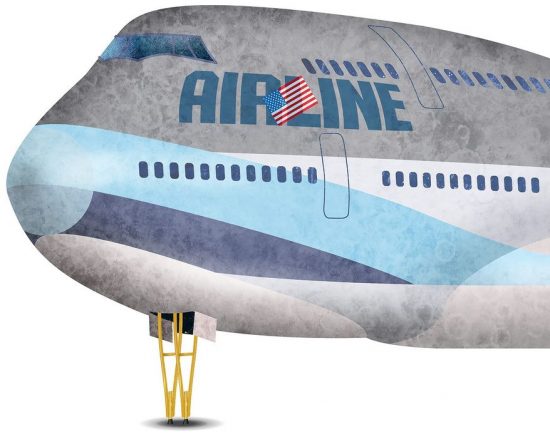In times of crisis, people often come up with really good ideas for dealing with problems and some really bad ideas. Many times, some of the really bad ideas are adopted, and at times, it takes many years to correct the mess that resulted.
One of the bad ideas that is now being floated by some in the Trump administration and in Congress from both parties is for the federal government to take an equity stake in the airlines and some other businesses in exchange for aid, to offset the losses from the COVID-19 virus. The advocates of equity ownership by government have a fundamental misunderstanding of the proper roles of both government and business in a capitalist society.
It is obvious that the airlines are in financial trouble through no fault of their own. Assume you have a farm with a stream running through some of your pastureland where you graze cattle. Your neighbor downstream from you decides to build a dam on the stream for flood control and irrigation. When completed, the pond created by the dam also floods some of your pastures, making it impossible to graze cattle on the affected land.
You have suffered a loss in the value of your property because of the actions of your neighbor, as well-intentioned as he/she may be. You would have a right to bring legal action against your neighbor and seek compensation for the loss of your property value.
Federal, state, and local authorities mandated the shutdown of much of the American economy, which has been a disaster for the airlines and many other businesses. We will not know for a matter of months, or perhaps years, if the stay-at-home strategy was correct — too much or too little — given the lives saved, the lives lost, and damage to the economy.
The government has the responsibility to protect persons and property and ensure liberty — and clearly the government did not and is not fulfilling its basic responsibilities in this case. Both the previous and the current administrations have known that the Chinese would be a likely source of any future pandemic because of their “wet markets” and their medical experimentation without adequate safety precautions. Clearly, much greater pressure by the U.S. and other governments over the last few decades should have been placed on the Chinese Communists to clean up their act.
Airlines (and many other businesses), their shareholders, employees and customers should not be paying a disproportionate share of the cost because of the failure of government leaders. The government ought to be providing direct aid and loans to the airlines under the condition that they keep compensating their employees until they are recalled — which hopefully will be in a matter of weeks rather than many months.
If the government insists on equity ownership in the airlines, the companies will be punished for a situation they did not cause. Even partial government ownership of companies causes many problems. The government bureaucrats that are tasked to sit on the boards of the companies or engage in oversight often have little or no experience in running an airline or other businesses, and thus are likely to make too many decisions on a political basis and pressure management and the workers’ unions to do things not in the interests of the stockholders or workers.
In the 2008 financial crisis, the government took an equity stake in both GM and Chrysler. Those two companies received cheap money from the government, putting Ford at a competitive disadvantage because Ford had committed the sin of managing its finances better. Eventually, the government sold its stakes in GM and Chrysler, at a big loss, because of bad timing. Chrysler eventually was sold to the Italian auto company, Fiat. Not a great success story.
To understand the proper role of government, think of a sports league like the NFL. The NFL office operates separately and independently from the teams. The league sets the rules for the game, provides the referees, and makes sure the rules are enforced. For all the obvious reasons, it would be inappropriate for the league to own any of the teams, or for league officials to sit on the boards of individual teams. The conflicts of interest would doom the enterprise.
The proper role of government is to set the rules for private enterprises to follow (which is the body of legislated and common law that businesses must comply with), and to make sure property rights and individual liberties are secure and fairly enforced.
The history of government ownership, or even partially owned enterprises, is not a good one. Decades ago, many airlines were owned by individual countries, either in part or whole. These so-called national carriers most often underperformed both financially and in customer service, and as a result, most of them have been privatized to the benefit of both the flying public and the worlds’ taxpayers.
There are many ways to offset the damage to the air carriers and to keep them viable. Government equity ownership in airlines is almost always a disaster. This proven bad idea ought not to be repeated.
https://www.washingtontimes.com/news/2020/apr/6/government-ownership-of-airlines-a-really-bad-idea/